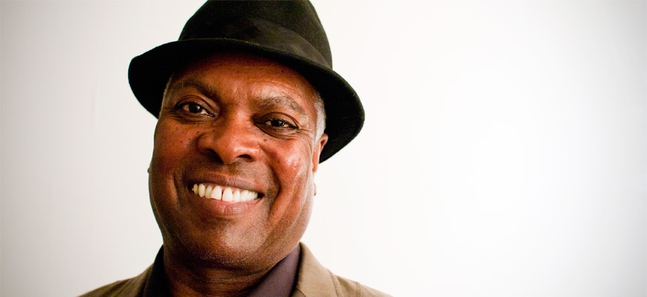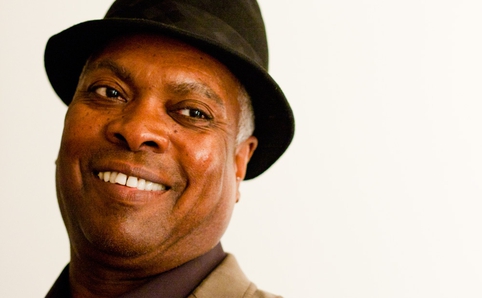Booker T. Jones: the interview
Time Out talks to the original Soul Man

Booker T. Jones, Tokyo 2011. Photo by James Hadfield
Posted: Tue Sep 13 2011
Everyone knows Booker T. Jones, though not everyone realises it. Despite being one of the most influential musicians of the last half century, he is best known as a session man and songwriter, plying his trade in the background, producing tunes that have been in the foreground more times than you could ever recall.
Booker T. was there when you began raiding your parents' vinyl collection in your teens, blazing loud behind Wilson Pickett on 'In the Midnight Hour'. He was there when you fumbled around on the dance floor, wracking up the emotion as Otis hammered home 'Try a Little Tenderness' (yes, that's him on keyboards in the video). Heck, he was even there when you learnt what soul music meant, defining a genre on the seminal Sam & Dave track, 'Soul Man' (although not at his usual Hammond B3, as we shall see). As a member of the MG's, the house band at hit-producing Stax Records, Booker T. pumped out classic upon classic throughout the '60s and '70s, and in their downtime the band recorded eternal slices of soulful funk – you probably know and adore 'Green Onions', 'Hip Hug Her' and 'Soul Limbo' (the latter better known to Brits as 'Test Match Special').
 The man himself is taller than expected (early footage makes him look so boyish, you'd almost think he was five foot nothing), and has the manners of a southern gent well into his sixties. He's almost apologetic when I wonder aloud how I might go about asking questions that he hasn't been asked before, and he's unfailingly polite in discussing the music that made him famous 50 years ago, a subject he must have to deal with on a daily basis. In more recent years, Booker T. Jones has been in the studio with the likes of Drive By Truckers and The Roots, laying down two of the most acclaimed albums of his long career, Potato Hole (2009) and The Road to Memphis (2011), and it's with these recordings fresh in his mind that we sit down in a quiet room beneath Blue Note Tokyo to discuss a career that has, even in some small way, affected most of us.
The man himself is taller than expected (early footage makes him look so boyish, you'd almost think he was five foot nothing), and has the manners of a southern gent well into his sixties. He's almost apologetic when I wonder aloud how I might go about asking questions that he hasn't been asked before, and he's unfailingly polite in discussing the music that made him famous 50 years ago, a subject he must have to deal with on a daily basis. In more recent years, Booker T. Jones has been in the studio with the likes of Drive By Truckers and The Roots, laying down two of the most acclaimed albums of his long career, Potato Hole (2009) and The Road to Memphis (2011), and it's with these recordings fresh in his mind that we sit down in a quiet room beneath Blue Note Tokyo to discuss a career that has, even in some small way, affected most of us.
There can't be many artists who pick up a Lifetime Achievement Grammy [in 2007] and then go on to make two of the most acclaimed albums of their career. What happened there?
I think I would've wanted to record [Potato Hole] had I not gotten that award. It's always been there – the spark never went out. Fortunately it never left. I shut myself down at night, as far as imagining music and creating new songs and themes. I have a method of shutting myself down so I can live in the normal world.
What is your method?
I meditate and I work on absolutely controlling my mind. It's totally impossible to be a creative musician in the real world – it just doesn't make any sense at all. You need to know where your car is! You can't write down a melody when you're in Sears with your kid. It's just totally impractical. So you have to be able to create when it's the correct time to create. You have to somehow be able to control your mind and corral those musings. You have to be able to remember, have a hell of a memory, or some way of making it come at an opportune time.
You're a rarity amongst 1960s musicians in that you can actually write music…
Yeah, I scribble. I have a little moleskin notebook with a stave on it that I try to jot notes down on. More recently, I have my iPad, and I can make notes on that. I keep a little Roland recorder, and that makes it easy. But if you're truly prolific, you have to come up with a discipline whereby maybe you're the only one who's going to experience this idea, so you have to have the confidence and discipline to wait for the next one. That's the kind of process I go through.
You've been on thousands of sessions, from stuff specifically with the MG's to classics like 'Soul Man'. Were they just work? Are there any sessions that stand out for you?
Well the process of getting there and doing them was just like work, just the same as being a street cleaner or anything – you get there at a certain time, you have your materials and you're ready to go. But, you know, because it's music there's always the potential for a special thing to happen. And there were many, many special moments that happened. So, no, it wasn't just work in that respect. It was very pleasurable. It was a real privilege to do that and to be able to make a living doing that.
But, for example, with a track like 'Soul Man', are you still able to put yourself in that session again, or do the vast number of sessions merge together in your memory?
Yeah, well, for me 'Soul Man' was just tambourine. That's the only thing I played on that song. (Laughs) I was listening to them create the whole thing, kinda standing in the back of the room by the door, and they felt they needed a little pop for the backbeat. So I walked in with the tambourine and went over to one of the drum mics and played a mallet on a tambourine. And that's all I did with that.
But still, what a track to have played tambourine on!
Well, thanks. Yeah.
To bring it forward a little, how did you go about picking bands like the Drive By Truckers and The Roots to play on your last two albums?
Drive By Truckers are a southern soul-rock band, but I was mostly enticed by the fact that they have been faithful to the three guitars. For the particular music that I was writing at that time, they were the band who most personified the sound that I wanted. But it had to be more than just the instrumentation. The people were wonderful. The people gave themselves over to my music, and that's what made it happen. It was a great human experience working with them. And that's just a chance you take: you never know what's going to happen there. But they brought food, they brought their entire selves, each and every one of them, and they were dedicated. And that's why that music turned out the way it did.
And with The Roots?
The Roots was a similar experience, but this was New York City and these were people who have worked with some of the best artists to come through the city. They work quickly, they are extremely talented, but they had a deep respect for the music I had made in the past. Actually, I think they were students in a lot of ways. So this was an opportunity to do some soul music with a hip hop band that actually used traditional instruments, which is a rare thing. I don't know of any other band that does that. So, once again, it was good fortune. I had my eye on them even before any of this happened. I have to give a lot of credit to Jimmy Fallon, who is just a big music fan. He wanted it to happen. But the expertise – the chops, as musicians like to call a musician's ability to play – was over the top. Questlove's drumming, Owen Biddle's bass playing, Captain Kirk's guitar playing were just what I needed at that time.
Have there been instances in the past when tracks of yours have been sampled into hip hop in a way that has impressed you?
You know, that has many, many times been a mind-opening experience for me, the latest instance being Kanye West and Jay-Z doing Otis's 'Try a Little Tenderness', which was a track we recorded just before we went to England. That little walk up thing that they used – I would never have considered it in the way they did. Hip hop music turns me on in a way that no other music does. The creativity and the imagination is surprising to me – it's great! Yes, that happens very often. I'll hear a song I conceived one way and they use it in a different way because they have the use of the technology. It's an eye opener.
When you first heard samples coming into music, perhaps back in the early to mid-'80s, was that something you were open to or were you initially standoffish about it?
I was open to it. It was a little strange for me at first, and I wasn't sure what to make of it, but they quickly got it together business-wise, which helps. But it's being done by musicians and producers who give it a new twist. I mean, I remember when I first heard 'Green Onions' re-used, and it was cool!
How many times has that track been covered?
[Slowly, emphasising each word] I have no idea. A lot.
There's an irony in that track's history, as I understand it, in that your producer was far more into it than you were...
There was no producer. There was just unused studio time and four studio musicians left with a session that didn't happen. We just had an open afternoon with nothing to do, so I just started playing that little riff that I'd been playing on piano, and I just tried it on the Hammond organ and it sounded like that, it sounded so cool. Actually, it was just a blues, but that little organ sounded so cool. It was what Ray Charles had used and it was something I had always had eyes for. So I took some lessons on a Hammond B3, and it was just providence, I guess. But there was no producer. Nobody saying, 'hey, we've gotta record that song.'
Was it a one-take job?
I think so. I don't remember.
Would you say it has become an albatross in some way? Artists are known for certain tracks, right? So how do you respond to it?
No, it hasn't been that. You know, the business is so crazy, I don't know if I'd be in the business if it wasn't for 'Green Onions'. I'm from Memphis, Tennesse, and Memphis would've been on the map without 'Green Onions'… It's hard to say. Everybody who gets into the industry from a small town has to have something of an albatross, I think, or how do you do it? It's an impossible task! There weren't no American Idol in 1962! But I love the song. I love to hear it and I love to play it. I don't get tired of it.
But can you fully comprehend the influence that it has had? I mean, you're talking to someone now who, at the age of 17, heard 'Green Onions' and was prompted to delve into a new area of musical history, into the mod culture…
The what culture?
The mod culture. Do you know about the mods? The UK? [Booker T. looks like he's listening to a raving loon] The 1960s? Quadrophenia...?
Ah, okay. Errm... yeah, I know...
I mean, I just wonder if you can comprehend how far that little track has travelled?
Okay, well that's all good information. I'm glad you told me. I'm beginning to comprehend it. I'm just glad to have been involved. It's amazing. Music is a powerful thing. It's unbelievable.
How do you go about selecting your setlist when you have so many tracks to choose from?
That has become a battle. The more I live, the more music I become involved in; the more music I love and like, the more music I want to share with the audience. It's been a discussion we've had since we've been here [in Tokyo], because I'm having trouble sticking to the setlist. I'll get up there and I'll look at people and I'll start playing one thing or the other, and what I'm hearing in my mind and what I'm feeling isn't the next song on the setlist. So I just go ahead and do what feels comfortable, and I'm off the list. But there's so much music in my past that I really love and really want to share. I mean, I have songs that I recorded with Bob Dylan, Otis Redding, Albert King, Barbara Streisand. All this music has meaning to me, and I balance all this with the new music… and it's just too much. There's not enough time in the show to do what I want to do. So I try and get right into the moment and play what's in my head.
You must have an incredibly tight band to follow you wherever you want to go.
Oh, they're amazing. Amazing! I love those guys, and they're willing to do that… they actually enjoy it. The other thing is, I have trouble sticking with playing songs in the same key. I was just dealing with that last night. We played 'Knockin' on Heaven's Door' in E, and I was fantasising about playing it in A. But they quickly know what to do; they know what key I'm playing it in and they play it in that key. So that's fortunate.
Are you a strict band leader?
In those ways, yes I am. But the guys don't complain about it too much. I give them the freedom to play what they want to play, it just has to be in the key that I dictate and the tempo that I dictate. But they can play what they want to play.
What's the status of the MG's at the moment?
We still play some. It's been about a year since we played; last time was up in Rochester, near New York. Duck [Donald 'Duck' Dunn, bass player] has since had surgery on his hands. He has a hereditary problem with his hands – he, his brother and his father had the curling of the fingers – and it got progressively worse. But that wasn't the main problem. The main problem was that we lost Al Jackson Jr [Stax drummer, shot dead at home after disturbing intruders in October 1975], who was a huge musical force for Booker T. & the MG's. That whole section of Memphis was influenced by him – record labels, all the clubs; the push was to get Al. Take 'Let's Stay Together' – the beat on that, you couldn't get that anywhere else other than Al Jackson. And that's what I grew up on. That was the guy that was playing drums while I was learning to play bass at the Flamingo [legendary Memphis soul club]. It was more than a loss, and that's what happened to Booker T. & the MG's. We've played with other great drummers but, not to take anything away from them, the essence of the band was created with him. But we've had some great times since then.
So the MG's will ride again?
Yeah. Duck is starting to play again. His operation was successful, so that's good. We'll just wait and see. But as I've gotten older, I've taken so many restrictions off myself musically, and there are so many great musicians. My experience with the Truckers and Neil Young was unbelievable, as it was with Questlove and The Roots.
Who's next then? Have you got a list?
No, no I don't. I just try and follow this path that I'm on and it leads me to these people. It just kinda happens. I'm learning how to let it take over, just let it do that. Instead of trying to guide myself, I'm learning how to follow.
Booker T. Jones is at Blue Note Tokyo until September 13, shows at 7pm and 9.30pm. His latest album, The Road from Memphis, is out now

Tweets
- About Us |
- Work for Time Out |
- Send us info |
- Advertising |
- Mobile edition |
- Terms & Conditions |
- Privacy policy |
- Contact Us
Copyright © 2014 Time Out Tokyo














Add your comment